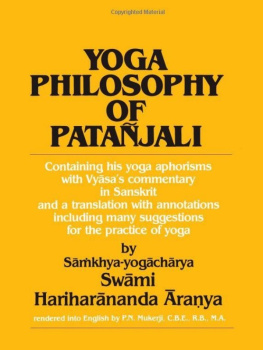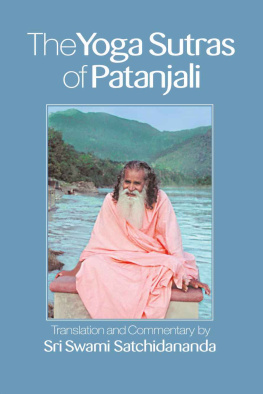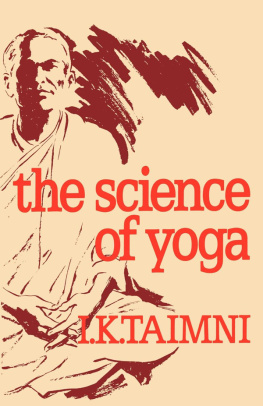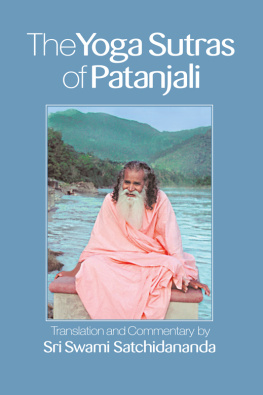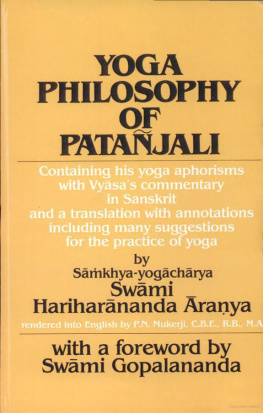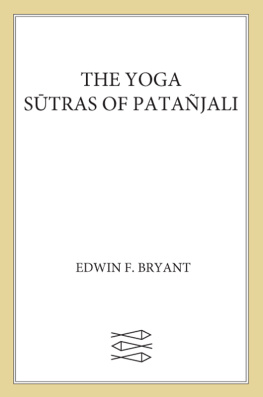Yoga Philosophy ofPatajali
Containing His Yoga Aphorisms withVysa's Commentary in Sanskritand a Translation with Annotations Including Many Suggestions forthe Practice of Yoga
By
Samkhya-yogacharya
Rendered into English
by
P. N. Mukerji, C.B.E., R.B., M.A.
STATE UNIVERSITY OF NEW YORK PRESS
ALBANY
Page ii
This book was first published in English by Calcutta UniversityPress in 1963. Revised editions were published by them in 1977 and1981.
Published by State University of New York Press, Albany
1983 State University of New York
All rights reserved
Printed in the United States of America
No part of this book may be used or reproduced in any mannerwhatsoever without written permission except in the case of briefquotations embodied in critical articles and reviews.
For information, address State University of New York Press,State University Plaza, Albany, N.Y., 12246
Library of Congress Cataloging in Publication Data
Patanjali.
Yoga philosophy of Patanjali..
Includes index.
1. Yoga. I. Hariharananda , Swami. II. Mukerji, Paresh Nath,1882-. III.
Vyasa . English & Sanskrit. 1983. IV.Title.
B132.Y6P267 1983 181'.45 83-4944
ISBN 0-87395-728-8
ISBN 0-87395-729-6 (pbk.)
20 19 18 17
Page iii
CONTENTS
Preface to the First Edition |
Introduction |
I. Indian Philosophy of Liberation |
II. Yoga, What it is, and What it isnot |
Yoga Philosophy of Patajali: |
Book I. On Concentration |
Book II. On Practice |
Book III. Supernormal Powers |
Book IV. On the Self-in-Itself orLiberation |
Appendixes |
A. Jnana-yoga |
B. Tattvas and their Realisation |
C. The Doctrine of Karma |
D. Collection of Yoga Aphorisms |
E. Diacritical Marks, Glossary of SanskritWords |
Index |
Page vii
PREFACE TO THE FIRST EDITION
Yoga is one of the six systems of Indian Philosophy, andPatajali's Yoga-sutra Monastery.
Under monastic convention the previous life-history of a monk isa sealed book but this much is known and can be stated that therevered Acharya , Rishikesh and Kurseongall inthe Himalayas. His last years were spent at Madhupur in Bihar wherehe lived the life of a hermit in a dwelling containing a built-upcave. The only means of contact at that time between him and hisdisciples was through a window opening on a big hall. He spent thelast twenty-one years of his life in that solitary sequesteredresidence where he left his mortal abode.
While leading a hermit's life the revered Swamiji beinghis magnum opus . Most of his books, the product of hismeditation and realisation, were written
Page viii
in Sanskrit or in his native language, Bengali. At first most ofthe books were published and distributed gratis by his disciples;nobody made his writings a commercial asset. When through thewritings of other writers quoting him and his philosophical views,Western scholars came to know of his vast erudition, they startedreferring spiritual problems to him for solution. They also maderequests for publication of his Yoga-darsana into English, butunfortunately his wish remained unfulfilled when he shuffled offhis mortal coil.
I was attracted to the monastery at Madhupur when afterprolonged quest in various parts of India in search of a spiritualguide I had come to this quiet little place more for rest than forsearch. By the merest accident I heard of the Philosophy taught atthe Kapila ?
After a serious heart-searching I took courage in both hands andsaid 'yes'. I was informed later that I could see the youngerSwamiji mentioned to methe unfulfilled wish of his preceptor the revered author, the
Page ix
great Acharya gave me every encouragement, placedthe library of the monastery at my disposal and passed words to allmembers and monks of the monasteryboth lay andordainedto give me every assistance in the preparation of thebook.
In the course of the intensive study, necessary for thepreparation of a faithful translation, backed by the elucidationand practical hints on Yoga from my master, I realised the vastnessof the comprehension of the essential principles by the writer ofYoga-darsana , who have to remove the doubts ofmany enquirers and who by their conduct and precept have toestablish that knowledge.
Apart from its spiritual aspect, the philosophy of Yoga has amoral value and is of no small practical utility in our everydaylife. The sages of old, in India, codified the rules fordisciplining the mind so that better human relations could developwhich are bound ultimately to bring about collective peace. It is acommon error to assume that too philosophical an attitude of mindis antagonistic to social progress, but a careful perusal of theYoga Philosophy would show that it is not tainted by sectarianism,its principles are of universal application, and that its doctrinesare in harmony with human advancement all round. If the
Page x
cardinal principles of human conduct enunciated in thisphilosophy are followed in practice, a better man will be built up,human relationship will be sweetened, a better society will comeinto being, and thus a better world.
I shall now explain the arrangement followed in the presentationof the subject. The aphorisms, or Sutras , have been denoted by numeralswithin brackets after them. These annotations have been given insmaller type preceded by these numerals within brackets.
The reader will find many Sanskrit words retained in the Englishrendering. A glossary of such words has been given as an Appendix.It has been found necessary to retain the use of such words becauseequivalents to denote the exact significance or import of theSanskrit words are not available in English. Wherever possible, theEnglish sense of the word has been given almost immediately in thetext or as near to it as possible. Sanskrit words used in the bookhave been transliterated according to the scheme adopted by theInternational Congress of Orientalists. The diacritical marks usedwith their phonetic equivalents are given in the Appendix.
In conclusion, I wish to place on record my gratefulappreciation of the valuable assistance rendered to me by myco-disciples of the Kapila for the enlightenment given me andfor looking over and correcting this book in manuscript which mademy task both a pleasure and a privilege.
P. N. MUKERJI
KAPILA ,
MADHUPUR,
BIHAR, INDIA
1963
Page xi
INTRODUCTION
Indian Philosophy of Liberation
The absence of any mention of historical dates in the ancientIndian treatises makes their chronological placement extremelydifficult. A careful and comparative study of the variations inlinguistic idioms noticeable in the Vedas and philosophicalwritings of different periods may, of course, help one indeterminingthough not with exactitudethe age of thedifferent works. But this method also has its limitations. Forthere are numerous instances of later compositions imitative ofolder linguistic styles and of ancient writings containing laterinterpolations. The Vedas contain, for example, Mantras andBrahmanas composed in severalvarying and mutually anachronistic linguistic forms.
The names of authors of the different works do not offer anychronological clue either, as these do not refer to specificindividuals. It is certain that there were more persons than onebearing the names of Vyasa . All these make it rather impossibleto conclusively place the Sanskrit literary or philosophical worksin any chronological order that will be beyond doubt. Nor is it ourpurpose to do so in this discussion which will be confined to astudy of the Indian religious philosophies with special referenceto the beginning, development and the highest fulfilment of whatmay be termed 'the philosophy of liberation'.

